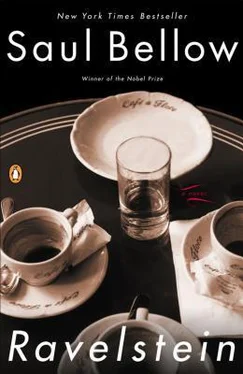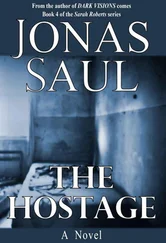Ravelstein the host coming now with a cheese platter, saying, "What about a chunk of this Vermont cheddar…?" ineptly brought the cheese knife, with uncontrollable nervous discharges in his fingers, down on the five-pound round of Cabot's supersharp.
When the cellular telephone in his trouser pocket rang, he drew apart to exchange a word or two with somebody in Hong Kong or Hawaii. One of his informants was calling in a bulletin. There were no security violations. Top secrets he neither heard nor asked to hear. What he loved was to have the men he had trained appointed to important positions; real life confirming his judgments. He'd go aside with his portable phone and then he'd return to tell us, "Colin Powell and Baker have advised the President not to send the troops all the way to Baghdad. Bush will announce it tomorrow. They're afraid of a few casualties. They send out a terrific army and give a demonstration of up-to-date high-tech warfare that flesh and blood can't stand up to. But then they leave the dictatorship in place and steal away…"
It gave Ravelstein the greatest satisfaction to have the inside dope. Like the child in the Lawrence poem sitting under a "great black piano appassionato,"
"in the boom of the tingling strings," while the child's mother plays.
"Well, that's the latest from the Defense Department…"
Most of us knew that his main source was Philip Gorman. Gorman's academic father had strongly objected to the Ravelstein seminars in which Philip was enrolled. Respectable professors of political theory had told old Gorman that Ravelstein was off the wall, that he seduced and corrupted his students. "The paterfamilias was warned against the bugger-familias," Ravelstein said.
Of course old Gorman would be too rigid to be grateful that his son did not go into business administration, Abe said. "Well, Philip is right now one of the Secretary's closest advisers. He has a powerful mind and a real grasp of great politics, this kid, whereas statisticians are as common as minnows."
Young Philip was one of the boys Ravelstein had educated over a span of thirty years. His pupils had turned into historians, teachers, journalists, experts, civil servants, think-tankers. Ravelstein had produced (indoctrinated) three or four generations of graduates. Moreover, his young men were mad for him. They didn't limit themselves to his doctrines, his interpretations, but imitated his manners and tried to walk and talk as he did-freely, wildly, pungently, with a brilliancy as close to his as they could make it. The very young ones-those who could afford the prices-also bought their clothes at Lanvin or Hermes, had their shirts made on Jermyn Street by Turnbull Asser ("Kisser Asser," as I revised it). They smoked with Ravelstein's erratic gestures. They played the same compact discs. He cured them of their taste for rock and they now listened to Mozart, Rossini, or, farther back, Albinoni and Frescobaldi ("on the original instruments"). They sold their collections of the Beatles and the Grateful Dead and listened instead to Maria Callas singing _La Traviata__.
"It's only a matter of time before Phil Gorman has cabinet rank, and a damn good thing for the country." Ravelstein had given his boys a good education, in these degraded times-"the fourth wave of modernity." They could be trusted with classified information, the state secrets they naturally would not pass on to their teacher who had opened their eyes to "Great Politics." You could see the changes their responsibilities had made in them. Their heads looked more firm and mature. They were absolutely right to withhold information. They knew what a gossip he was. But he himself had very important secrets to keep, information of a private, dangerous nature which only a few could be trusted with. Teaching, as Ravel stein understood teaching, was tricky work. You couldn't afford to let the facts be generally known. But unless the facts were known, no real life was possible. So you made your choices with a jeweller's touch. There were two people in Paris who knew him intimately and three on this side of the Atlantic. I was one of them. And when he asked me to write a "Life of Ravelstein," it was up to me to interpret his wishes and to decide just to what extent I was freed by his death to respect the essentials-or the slant given by my temperament and emotions to those essentials, my swirling version of them. I suppose he thought it wouldn't really matter because he'd be gone, and his posthumous reputation couldn't matter less.
Young Gorman, you may be sure, edited the information he gave to Ravelstein. He wouldn't have gone beyond the facts in tomorrow's press release. But he knew what pleasure it gave his old prof to hear the inside dope, so he briefed him out of respect and affection. He also knew that Ravelstein had masses of historical and political information to update and maintain. This went as far back as Plato and Thucydides-perhaps as far back as Moses. All those great designs of statesmanship-going back through Machiavelli via Severus or Caracalla. And it was essential to fit up-to-the-minute decisions in the Gulf War-made by obviously limited pols like Bush and Baker into a true-as-possible picture of the forces at work-into the political history of this civilization. When Ravel stein said that young Gorman had a grasp of Great Politics, something like this was what he had in mind.
At every opportunity, on any reasonable pretext, Ravelstein zipped across the Atlantic to Paris. But that didn't mean he was un happy with the urban Midwest. He was attached to the University, where he had taken his degree under the great Davarr. He was an American through and through.
I had grown up in the city, but Ravelstein's people hadn't arrived from Ohio until the end of the thirties. I never met the father, whom Ravelstein described to me as a toy ogre, a huffy little man, and a neurotic disciplinarian. One of those small-time tyrants who control their children with demented screams, in some crazy nonstop family opera.
The University accepted high school kids who could pass its en trance exams. Ravelstein was admitted when he was fifteen years old and then was free from his father and from a sister he disliked almost as much. As I have said, he was fond of his mother. But at the University he was rid of all the Ravelsteins. "My real mental life began here. For me there was nothing better than the student rooming houses where I bunked. I never could see what was so disgraceful about 'stiffening in a rented house,' as Eliot wrote. Do you croak better on your own property?"
Still, without being envious (I never knew Ravelstein to envy anybody), he had a deep weakness for pleasant surroundings and liked to think of living in one of the tony flat buildings formerly occupied by the exclusively WASP faculty. When he returned to the University as a full professor after two decades on lesser campuses, he wangled a four-room apartment in the most desirable building of all. Most of his windows looked into the dark courtyard, but be yond he could see the campus to the west with its gothic, Indiana limestone spires, labs, dormitories, office buildings. He could stare at the tower of the chapel-a kind of truncated Bismarck Colossus with bells that boomed over and beyond the University compound. When Ravelstein became a national figure (an international one as well-his Japanese royalties alone were, he said with wild pleasure and no modesty, "ferocious"), he moved into one of the best apartments in the place. Now he had views in all directions. The late Madame Glyph, who put him down for drinking from a Coke bottle at her T. S. Eliot luncheon, had not been better situated.
Curiously enough, there was a monastic-retreat tone to his place. You entered under low vaulted ceilings. The lobby was paneled in mahogany. The elevators were like confession boxes. Each apartment had a small flagstone entry hall, and a gothic light fixture overhead. On Ravelstein's landing there was often a piece of furniture on its way out, displaced by some new purchase or other-a chest of drawers, a small armoire, an umbrella stand, a Paris painting about which he was beginning to have doubts. Ravelstein could not compete with the Glyphs' collection of Matisses and Chagalls, begun in the twenties. But in the kitchen he went far beyond them. From a restaurant supply company he had bought an espresso ma chine. It was installed in the kitchen, it dominated the sink, and it steamed and fizzed explosively. I refused to drink his coffee because it was made with chlorinated tap water. The huge commercial ma chine made the sink unusable. But Ravelstein had no use for sinks-it was only the coffee that mattered.
Читать дальше












